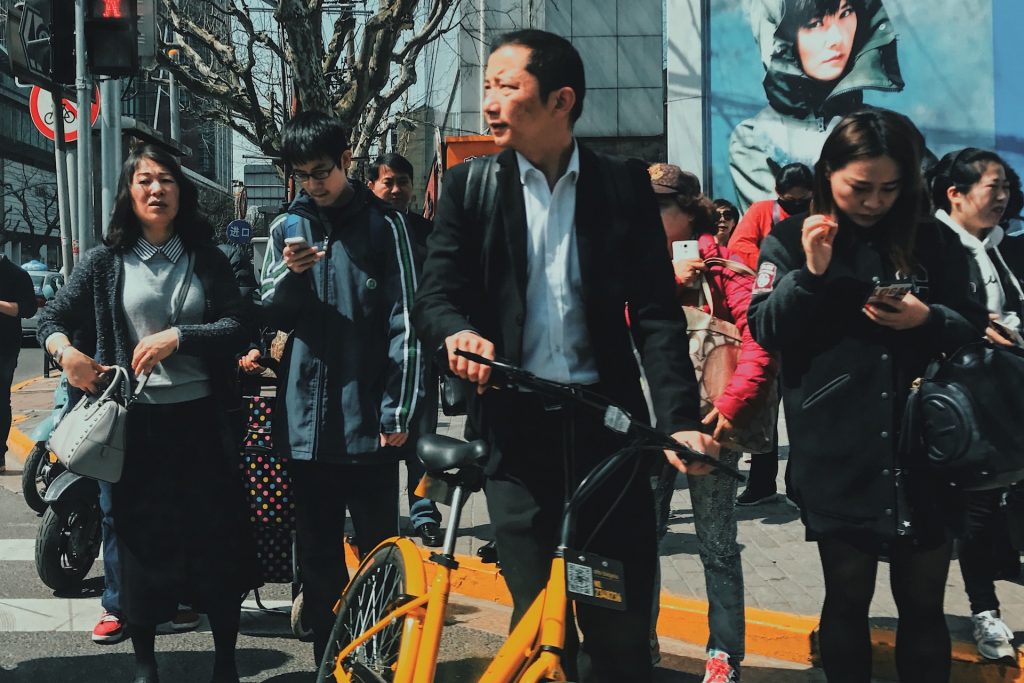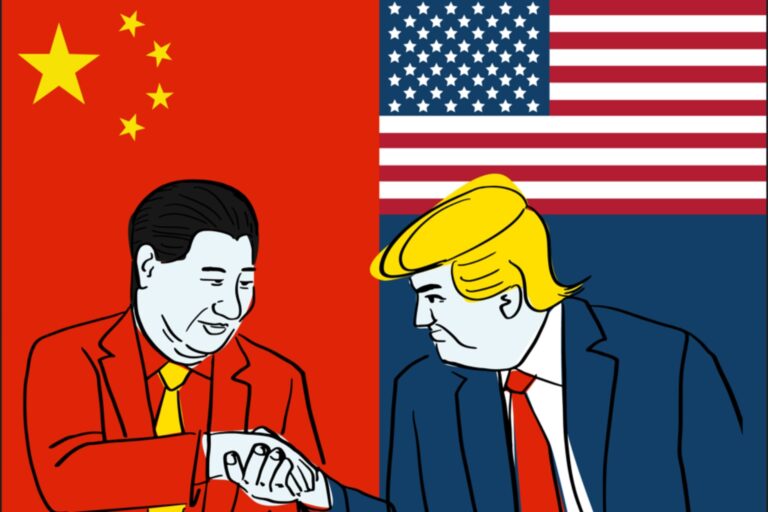Artificial intelligence (AI) is transforming how states worldwide address their domestic issues. China’s prowess is growing in the AI arena, which the United States currently leads. The utility of Chinese AI technology received further validation during the COVID-19 pandemic. On the bright side, its precision and efficiency proved essential to many public health programs funded by the Chinese government. However, the increasing societal presence of AI also aroused the Chinese public’s awareness of the multitude of ethical controversies caused by its widening applications, particularly in the contentious fields of public health and mass surveillance, which harbor serious risk for massive privacy breaches. These clamors, which echo worldwide, arise from the concern over the Orwellian future that mass AI deployment could herald.
The ethical aspects of Chinese AI are also intertwined with the nation’s global ambition. In 2020, the Chinese diplomatic apparatus engaged with international organizations to discuss the prospect of an ethical code for the civil and military applications of AI for potential regulation by an international organization. China also reached out to US counterparts to explore the possibility of forming a set of rules that define the bounds of the militarization of AI. Efforts such as these will cement China’s role as one of the essential contributors to global norms that will exert a significant influence on both geopolitics and international economic activities in the future. How China facilitates its domestic AI policy and applications significantly affect the outcomes of these diplomatic efforts.
Coronavirus Pandemic: The Fuel of the AI Surveillance and Tangible Checks of Civil Society
The COVID-19 pandemic incentivized the expansion of AI surveillance tools in China. In cities like Tianjin, the municipal authority utilized the AI facial recognition systems initially designed for community security to locate potential infectors.[1] The system’s mechanism runs individual facial and ophthalmologic features through a database that stores all community residents’ designated bio-features.[2] If a visitor is not a community resident, their access to the residential buildings is denied. The individual is then referred to the community center to go through temperature testing procedures to prove that they are not infected with coronavirus before community access would be granted.[3] The system also tracks the travel records of residents. Linked to the municipal government’s database, the system can outline which individuals have traveled to the high-caseload Red Zone and can subsequently notify the community center to issue an instruction to quarantine to the designated household.[4] To the Chinese government, these are handy systems in containing the coronavirus pandemic.
While the government-sponsored AI surveillance system’s pervasive presence incited discontent from the civil sector, this did not mean the government was unresponsive to citizen concerns. In contrast to the conventional perception that China would silence all its domestic criticism due to its authoritarian nature, one Chinese citizen successfully defended his rights to privacy when violated by the AI surveillance system through the rule of law. In 2019, a professor named Guo Bing (郭兵) from the Zhejiang Sci-tech University(浙江理工大学) sued Hangzhou Safari Park (杭州野生动物园) for “violating his rights of privacy by allowing the facial recognition devices of the surveillance system to collect his facial data without his consent.”[5] The local court ruled in Guo’s favor over the Safari Park, which has deep ties with the Chinese public sector because it houses the National Conservational Facility for pandas.[6] The plaintiff also won remedies for his legal costs and had all data related to his privacy deleted.[7]
The Guo Vs. Safari Park case was referred by Xiake Dao (侠客岛), one of the significant subsidiary media outlets of the People’s Times (人民日报), as the embodiment of the authority of the national “Regulatory Measures of Informational and Private Data Security” (信息安全技术个人信息安全规范).[8] This regulatory rule mandated that collecting facial data, fingerprints, and any form of individual biological features requires an individual’s consent.[9] Meanwhile, the Municipality of Hangzhou, where the lawsuit took place, also amended community regulations to include “prohibiting managing agencies of housing estates from enforcing the collection of biodata, including fingerprints and facial data, of their real estate owners.”[10] Those measures serve as evidence of the Chinese state’s efforts to curb the violation of citizens’ privacy in its AI surveillance system.
The scientific apparatus of the public sector of the Chinese AI industry has also been conducting research that may add impetus to efforts by legal professionals to push for judicial changes to privacy law. [11] A research team from the Artificial Intelligence Institute of Tsinghua University conducted a wide array of experiments to evaluate the security of AI-powered facial recognition mechanisms for cellphone applications made by developers from the public and private sectors.[12] The results of their experiments were worrisome; most of the tested applications equipped with facial recognition technologies were either easily hacked by malware attacks or deceived by physical camouflage in the form of 3D-printed masks exploited by criminals to disguise themselves as their potential victims.[13] The researchers expressed concern that hackers could easily breach commercial AI facial recognition systems’ security in the Chinese market should they invest in even collecting rudimentary personal data of their potential victims, like a simple photograph. Legal professionals reiterated those problems while testifying to this in the Chinese legislative process. One of these is Gao Jinping (高警兵), a Beijing attorney who serves as a member of the Beijing Political Consultative Conference (北京市政协). Gao stressed the necessity for the state to detail the provisions related to individual privacy protections involving AI facial recognition technology in the “individual Information Protection Act” (个人信息保护法), which policymakers are still drafting.[14]
While the judiciary process is still underway, the Chinese government demonstrated its will to protect its citizens’ privacy from the overreach of AI technologies in the March 15 Gala (315晚会) of 2021—an annual event hosted by the state-owned China Media Group designed to address issues concerning consumers’ rights. During the event, Chinese state media exposed the overreach of the AI facial recognition systems deployed by private companies in retail stores to collect their customers’ facial data.[15] The event also revealed and chastised private contractors responsible for the deployment of the systems.[16] In addition, the event highlighted violations of privacy protection regulations.[17]
Choosing between the State and the Public Good
The prospect of the Chinese AI industry is greatly influenced by the nation’s top legal minds. Jurists from institutes like the Law and Technology Institute of Renmin University of China (LTIRUC;中国人民大学未来法治研究院) are the pioneers in contributing legal theories that provide the foundation for the framework of Chinese AI policy. The divergent stance taken by those scholars was manifested in the struggle to balance between the protection of citizen rights to privacy and the overreach of the surveillance promoted both by the state and big businesses.
Choosing to advocate for privacy rights, Prof. Chen Lei (程雷) of LTIRUC recognizes the overreaching authority of the Chinese government in promoting AI surveillance under the Criminal Procedure Act (CPA; 刑事诉讼法) and Counter-Terrorism Act (CTA; 反恐法). However, Chen argues that China’s current legal system cuts the state too much leeway in intruding on citizens’ privacy. For instance, the legislation does not specify the type of personal digital information collected for purposes of criminal justice and national security, which in theory had left a legal loophole that could be used to justify the creation of a full-swept national surveillance system that intrudes into every facet of citizens’ lives.[18] Chen also notes that both pieces of legislation lacked statutes to designate the establishment and operation of regulatory agencies of either governmental or civilian nature to oversee the collection, storage, and usage of private data.[19] Furthermore, Chinese citizens are devoid of rights to appeal to a higher branch of the nation’s judicial system for the violations of their privacy rights that may occur in the collection of big data;[20] this repository of digital footprints and biological features may be vulnerable to exploitation by E-Commence conglomerates in the form of direct and invasive marketing. If those invasions occurred, there is currently no provision in the Chinese legal system to deter those malpractices.[21]
Chen recognizes that the flaws embedded within the Chinese legislations involving Big Data collection and surveillance could lead to the inception of a pervasive, ultra-intrusive surveillance system.[22] His observation resonates with the current impression of Chinese society of the broad deployment of AI facial recognition systems attested to by the public health applications to curtail the COVID-19 pandemic. However, Chen also states that state-wide surveillance is an inevitable reality for information, especially in a society like that of China.[23] Therefore, Chinese citizens must realize that they are engaging in a tradeoff with the government in which they exchange part of their fundamental right for security and social harmony.[24] Nonetheless, the government is still obligated to contain the overreach of the surveillance and reasonably accommodate citizens’ right to privacy to honor its commitment to the public good.[25]
Chen offers recommendations for the reforms of the Chinese legal system as follows:[26]
- Ensuring citizens’ Right to Information protection within the boundary of Chinese law (which enforces limited restriction for the state to gather private data) should data concerning their privacy (biological features, digital footprints, communications records, etc.) be incorporated in prosecution. The government also needs to keep records of the collected data to ensure no further intrusion of the defendant’s privacy went beyond the legal boundary.
- Installing both legislative and judiciary oversight concerning privacy. Institutions like the National People’s Assembly could form a special committee to monitor and oversee the collections of private data and judiciary incidents related to them. On the other hand, a special Information and Intelligence Court could be established to supervise the surveillance operations to be carried out within the boundary designated by the CPA.
- Establishing mechanisms of due process for surveillance operations. In circumstances in which the law enforcement procures the citizens’ private data via services provided by the commercial entities, its permanent possession of the data should be prohibited to set a legal precedent to prevent the unrestricted exploitation of citizens’ private data in the future.
LTIRUC Jurists like Din Xiaodong (丁晓东) took the opposite path to align with pro-government and pro-business utilitarianism. In his work titled “On Digital Monopoly: Jurisprudential Thoughts on Countering Monopoly Under the Scope of Big Data” (论数据垄断:大数据视野下反垄断的法理思考),[27] the author argues that strenuous regulation on business entities’ collection of big data, such as the imposition of Antitrust acts, would be counterproductive in serving its original purpose of protecting the consumer rights,[28] epitomized by right to privacy in the case of AI. Din states that big data collectors’ profitability depends on providing targeted service to their clients based on the collected data.[29] Under that circumstance, acquiring more information would better the quality of service the customers would receive—thus increasing their welfare, which is the purpose of consumer rights protection.[30] Therefore, regulatory flexibility must feature in the regulation of big data companies, whether Antitrust or Privacy protection legislation, to ensure that the companies can grow from their evolution in the content and the means of private data collection.[31] The author summarizes his belief that legislators should aim to balance government regulation and the free market. He envisions that the optimal scenario for the big data business would be where the consumers benefit from the boom of affiliated companies and a reasonable degree of government regulation that harbors the will of fostering the growth of the business.[32]
Under Din’s vision, the policymakers have higher hope for the AI industry of private and public holdings to bolster the economy with exceptional growth. Under the authoritative supervision of the Chinese government, the AI industry would likely undergo exponential growth with official support and leniency while being placed under regulations that prevent it from overreaching into citizens’ lives unbridled or expanding beyond the state’s control. If Din’s legal theory is to be constituted as the bulwarks of the global AI governance China intends to promote, they would undoubtedly cause serious backlashes that could thwart the initiative.
Chinese Efforts in Redefining Global AI Governance
The Chinese government sees its accomplishments in the AI industry as a boost to its vision of setting the agenda for global AI governance.
Quasi-official Chinese think tanks like the Taihe Institute (太和智库) are vocal representatives of the nation’s ambition. The institute petitioned the G20 forum in 2020 to establish “an international Governance for Artificial Intelligence.”[33] The director of Taihe’s European branch, Thorsten Jelinek, disclosed the essence of the petition as follows:[34]
Firstly, the world needs to understand the risk of abuse of AI technologies, particularly in military and intelligence apparatuses. If left uncurbed, the AI could instigate a tsunami of cybersecurity crises. This wave would also likely be harnessed by extreme political power and terrorist cells to cripple the three pillars of modern statehood: bureaucracy, the rule of law, and government accountability. These negative impacts could ferment techno-nationalism, further aggravating the current geopolitical instability worldwide.[35]
Secondly, the international community needs a multilateral institution of governance to deal with AI. Therefore, the European Center of the Taihe Institute proposed that the Coordinating Committees provide funding for the Governance of Artificial Intelligence (CCGAI) under the guidelines of the G20 forum.[36] CCGAI’s primary goal is to be a promoter and coordinator of global AI governance. Its primary goals are:
- Installing the agenda of global AI governance with the institution of the G20 forum and coordinating with other agencies within and beyond the G20 apparatus to facilitate the making of commitments, regulations, and international treaties related to global AI governance.
- Instilling a sense of accountability for AI global governance among the members of G20 while establishing a rudimentary setting of international consensus that the member states could follow in participating in the governance.
- Establishing a forum for member states to share their experiences of AI regulation and coordinate the development and oversight of their domestic regulatory measures internationally.
The Chinese version of setting up global AI governance also harbors practical geopolitical concern. Senior Chinese diplomat Fu Ying stated in an article published in December 2020 that AI governance and the mechanism of dialogue it contains is crucial to mitigate escalating Sino-American tension.[37] She notes that militarization of AI is inevitable for techno-superpowers liked China and the United States. Furthermore, the militarization is likely to increase and bestow radical political powers with the capability of assaulting infrastructure, presenting a more significant threat to both nations’ national securities.[38] Thus, Fu argues, it is in the interest of China and the United States to negotiate the guidelines that would constitute the future AI global governance under the framework of G20.[39] Most of all, those guidelines are needed to prevent the militarization of AI from turning into an arms race that would drive the bilateral relationship further towards a zero-sum game.
What the Stakeholders Should Do
Chinese efforts in constructing its global governance have always been galvanized by its ambition to write rules for AI at home and abroad. They feature the Third Way approach the nation intends to take: incentivizing the industry’s growth while keeping a firm grip on its impact on civil society and commercial prospects and advocating for global governance where it could borrow strength in the international diplomatic and geopolitical arena.
The United States could use a market tool to influence the direction of the Chinese AI industry. The Chinese government still relies much on private entities to facilitate AI innovations—so much so that it concedes to them the access of big data. But, as self-serving as all private businesses are, the firms are bound to seek foreign market expansions. American leaders could use US global influence to pressure those entities to take a more ethical stance in big data collections in domestic markets according to the stricter privacy laws they would have to abide by in foreign markets (or else be denied foreign profitability). In return, the Americans could convince some of their partners to grant market access to Chinese AI companies. Therefore, the United States would be able to install a tangible check in the Chinese AI development to prevent it from enabling intrusive surveillance.
As for China, it needs to sustain the fair stance of privacy protection in its legal apparatus. While the pandemic has brought Chinese citizens under the government’s lens, the latter ought to convince the country and the world that the public good is its primary concern. Therefore, legal reforms conducted under the framework suggested by jurists like Chen Lei (程雷) are essential. The renovated legal system could thus produce more positive precedents on citizen’s privacy rights to reinforce the positive reputation of the AI surveillance system the government intends to build. Finally, both China and the United States could form an international council to establish universal ethical AI standards. Though bilateral agreements are becoming harder to reach given their domestic politics, the least they could do is draw the line on the proliferation of AI militarization since failure to do so would drag them into a devastating AI arms race. Once succeeded, this collaborative effort would pave the way for future cooperation in writing the global AI rules while accumulating goodwill in the bilateral relationship.
[1] Beijing Youth Daily 北京青年报, “Tianjin Shoutui Renlian Shibie Jincailing Zhihou: 600hu de Xiaoqu, 50hu Jujue Zai ‘shualian’ 天津首推人脸识别禁采令之后:600户的小区,50户拒绝再‘刷脸’ [After Tianjin First Implemented Ban on Facial Recognition Collection: In a 600-Household Neighborhood, 50 Households Refused to Scan Their Faces Again],” ifeng 凤凰网资讯, January 1, 2021, https://news.ifeng.com/c/82foWDz1vDR.
[2] Beijing Youth Daily, “Tianjin.”
[3] Beijing Youth Daily, “Tianjin.”
[4] Beijing Youth Daily, “Tianjin.”
[5] Xiake Dao 侠客岛, “Jieju Qiangzhi Shualian? Gai Guanzhu Yinsi He Jishu Fengxian Le【解局】强制刷脸?该关注隐私和技术风险了 [Insight: Obligatory Face-Scanning? Time to Pay Attention to Privacy and Technology Risks],” souhu 搜狐, December 1, 2020, https://www.sohu.com/a/435660534_357283.
[6] Xinhua 新华社, “Guojiaji Daxingmao Keyan Fanyu Zhongxin Luohu Hangzhou 国家级大熊猫科研繁育中心落户杭州 [National Panda Research and Breeding Center Settles in Hangzhou],” gov.cn 中国政府网, April 15, 2018, http://www.gov.cn/xinwen/2018-04/15/content_5282621.htm.
[7] Xiake Dao, “Jieju.”
[8] Xiake Dao, “Jieju.”
[9] Xiake Dao, “Jieju.”
[10] Xiake Dao, “Jieju.”
[11] “19bu Shouji Bei ’Miaojie’! Rangren Aihen Jiaozhi de Renlian Shibie Jishu Haineng Yongma? 19部手机被‘秒解’!让人爱恨交织的人脸识别技术还能用吗? [19 Phones Hacked in Seconds! Can the Loved-and-Hated Facial Recognition Technology Still Be Used?],” China.cnr.cn, January 30, 2021, http://china.cnr.cn/xwclj/20210130/t20210130_525403861.shtml.
[12] China.cnr.cn, “19bu.”
[13] China.cnr.cn, “19bu.”
[14] China.cnr.cn, “19bu.”
[15] Chaoran Xiong 熊超然, “315 Wanhui Baoguang: Renlian Xinxi Souji, Jianli Fanmain, Youjian Shouroujing… 315晚会曝光:人脸信息搜集、简历贩卖、又见瘦肉精…… [315 Gala Exposed: Facial Recognition Data Collection, Resume Selling, Clenbuterol Again],” Guancha.cn, March 15, 2021, https://www.guancha.cn/politics/2021_03_15_584172.shtml.
[16] Chaoran Xiong, “315 Wanhui.”
[17] Chaoran Xiong, “315 Wanhui.”
[18] Lei Cheng 程雷, “Shuzi Fazhi | Cheng Lei: Dashuju Beijingxia de Mimijiankong Yu Gongmin Geren Xinxi Baohu 数字法治|程雷:大数据背景下的秘密监控与公民个人信息保护 [Digital Governance | Cheng Lei: Secret Surveillance and Citizen Personal Information Protection under the Context of Big Data],” 163.com, May 29, 2021, https://www.163.com/dy/article/GB5VLJP10514AGAB.html.
[19] Lei Cheng, “Shuzi.”
[20] Lei Cheng, “Shuzi”
[21] Lei Cheng, “Shuzi.”
[22] Lei Cheng, “Shuzi.”
[23] Lei Cheng, “Shuzi.”
[24] Lei Cheng, “Shuzi.”
[25] Lei Cheng, “Shuzi.”
[26] Lei Cheng, “Shuzi.”
[27] Xiaodong Ding丁晓东, “Ding Xiaodong | Lun Shuju Longduan: Dashuju Shiyexia Fanlongduan de fali sikao 丁晓东丨论数据垄断:大数据视野下反垄断的法理思考 [Ding Xiaodong | On Data Monopoly: Thoughts on Anti-Monopoly Legal Theories under the Vision of Big Data],” The Paper 澎湃新闻, May 20, 2021, https://www.thepaper.cn/newsDetail_forward_12783079.
[28] Ding, “Ding.”
[29] Ding, “Ding.”
[30] Ding, “Ding.”
[31] Ding, “Ding.”
[32] Ding, “Ding.”
[33] “G20 Kuangjiaxia de Quaniu Rengong Zhineng Zhili G20框架下的全球人工智能治理 [Artificial Intelligence Governance under the G20 Framework],” sina.com, December 31, 2020, http://k.sina.com.cn/article_3057540037_b63e5bc502000y37c.html.
[34] Sina.com, “G20.”
[35] Sina.com, “G20.”
[36] Sina.com, “G20.”
[37] Renmin Luntan 人民论坛, “Fu Ying: Rengong Zhineng Yu Guoji Anquan Zhili Lujing Tantao 傅莹:人工智能与国际安全治理路径探讨 [Fu Ying: Discussion on Artificial Intelligence and International Security Governance Paths],” 163.com, January 4, 2021, https://www.163.com/dy/article/FVG17LJ905501EMW.html
[38] Renmin Luntan, “Fu.”
[39] Renmin Luntan, “Fu.”




